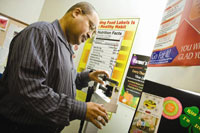Office of Research & Development |
 |


In a study at the Philadelphia VA Medical Center, African American Veterans with hard-to-control diabetes who were matched with peer mentors made significant gains in keeping their blood sugar in check. The results appeared March 20 in the Annals of Internal Medicine.
The study included 118 African American Veterans, all of whom were having trouble controlling their diabetes.
One group received telephone counseling from peer mentors—other African American Veterans with diabetes who had overcome their own struggles to keep their blood sugar at healthy levels. After a brief training session, the mentors earned a small reward—$20 per month—if they contacted the person they were helping at least once a week throughout the six-month study.
A second group received standard medical care, with no additional supports.
A third group was assigned to the "financial incentive" arm of the study. They became eligible for up to $200 at the end of the study if they were able to significantly lower their blood sugar.
Of the three arms, the peer group made the biggest gains. On average, their hemoglobin A1C—a measure of blood sugar over the past two to three months—dropped about a point, from 9.8 to 8.7 percent. Good control for those with diabetes is considered around 7.5 to 8 percent.
The usual-care group saw only a slight drop in their hemoglobin A1C levels, from 9.9 to 9.8 percent. The financial incentive group showed a modest improvement—from 9.5 to 9.1 percent—but it was not statistically significant.
Because the study lasted only six months and the study population was relatively small, the authors say further research is needed. On the whole, though, the results jibe with those from past studies in which mentoring or reciprocal peer support helped patients with diabetes—particularly minorities—boost their medication adherence, diet, exercise, blood glucose monitoring, and glucose control.
"Peer mentoring appears to be an excellent way to enhance self-management for this group of patients," says lead author Judith Long, MD, an internist with VA and the University of Pennsylvania. "Among other reasons for the intervention's success, we believe there was a strong culture of camaraderie among the Veterans who took part in the study." She says social support is a critical factor in helping patients manage chronic illness, but friends and family are often not able to fill the role.
The study was conducted by researchers with VA's Center for Health Equity Research and Promotion, based in Philadelphia and Pittsburgh, along with colleagues from the University of Pennsylvania and Carnegie Mellon University. Funding was provided by VA and the National Institute on Aging.